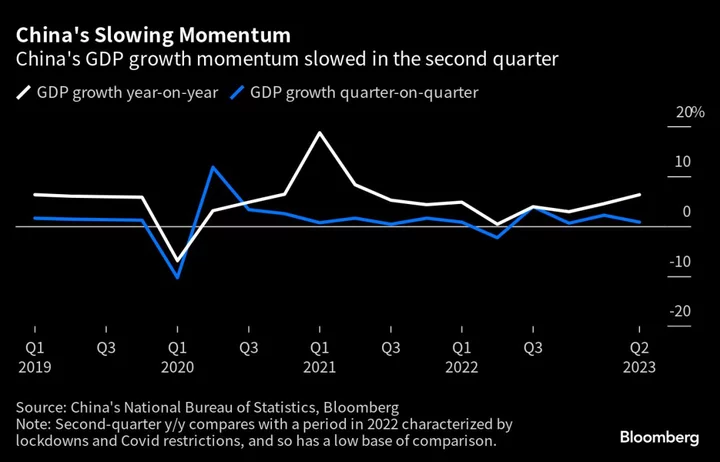China will likely keep cutting interest rates, speed up the issuance of infrastructure bonds and loosen more property policies after top leaders signaled fresh support for the economy is on the way.
The ruling Communist Party’s Politburo laid out a pro-growth tone at its key economic meeting this week that was “slightly more dovish” than markets expected, according to economists at Goldman Sachs Group Inc. and elsewhere. That’s bolstered sentiment and sent Chinese stocks and the yuan higher Tuesday as investors await more details on aid.
The 24-member decision-making body led by President Xi Jinping seems to have become more concerned about a waning recovery — though officials are still expected to hold off from rolling out any massive stimulus as they’re mindful of debt risks and over-stimulating the economy.
That may mean Beijing does enough to secure its growth target of around 5% for the year — “but not so much as to greatly accelerate the gradual, services-driven rebound now underway,” said Michael Hirson, China economist at 22V Research LLC.
Here’s a look at the actions analysts are expecting from China in the coming months:
Interest Rates
The use of the phrase “aggregate” monetary policy tools in the statement suggested “more policy rate cuts would happen down the road,” according to economists at Macquarie Group Ltd.
The meeting also used the phrase “counter-cyclical,” the economists including Larry Hu pointed out — a first since 2019. Those words imply an easing bias, they wrote in a Monday report.
UBS Group AG economists led by Wang Tao see the People’s Bank of China potentially cutting policy rates by 10 basis points in the back half of the year, after trimming rates in June.
The UBS economists also expect the central bank to cut the reserve requirement ratio — the amount of cash lenders have to keep in reserve — by 25 basis points, as well as inject more liquidity into the banking system via open market operations. They see year-on-year credit growth accelerating to 10% by the fourth quarter, up from 9% last month.
Bond Issuance
The Politburo vowed to speed up the issuance and use of local government special bonds — a strategy typically used to boost infrastructure growth.
Local governments sold 2.17 trillion yuan worth of bonds meant for infrastructure investment in the first half of the year, the Ministry of Finance said at a briefing last week. That means there is still about 1.6 trillion yuan left in new special bond quota for this year to use by the end of December.
Assuming that most of this year’s remaining allowance is used up by the end of October, the pace of issuance in the coming months would be “sharply faster” than in the second quarter, Huachuang Securities analysts including Zhou Guannan wrote in a Monday note.
They said the government may also sell some special refinancing bonds — notes issued previously by some regions to swap liabilities of local government financing vehicles — as part of a debt resolution package referenced by the Politburo.
The possibility that local governments may be allowed to “dig into” unused special bond quota from prior years can’t be ruled out, according to Citigroup Inc. economists led by Yu Xiangrong. In a note published after the Politburo meeting, they estimated that quota was worth around 1.1 trillion yuan.
Property Easing
The “biggest move” signaled out of the Politburo meeting was a pledge by officials to “adjust and optimize property policies timely,” according to the Citi economists.
They flagged a few easing measures that are likely in the pipeline, including the construction of more affordable housing and the renovation of “urban villages” in mega cities. The latter may amount to a “mini version” of China’s “shantytown redevelopment” projects that emerged from the property downturn in 2015, they said.
Some restrictive measures in large cities may also be eased marginally, wrote Nomura Holdings Inc. analysts including Lu Ting. However, they warned there is “no quick fix” for the property sector, adding that a large-scale shantytown-like program funded by cheap policy loans is unlikely.
Local Debt
Top leaders said they will create a package to resolve issues with local government debt, vowing to “effectively” prevent and defuse the crisis. Such debt burdens have slowed government spending growth this year.
The government may encourage lenders to extend or restructure the debt that local governments and their financing arms have borrowed, the UBS economists wrote. They added that local authorities may also be pushed to sell or mortgage some assets to gain more liquidity.
A wholesale swap of local government financing vehicle debt — or even a bailout — is unlikely in the near term, the economists added, citing the size and complexity of the issue, along with potential moral hazards.
--With assistance from Tom Hancock.

